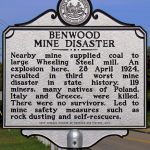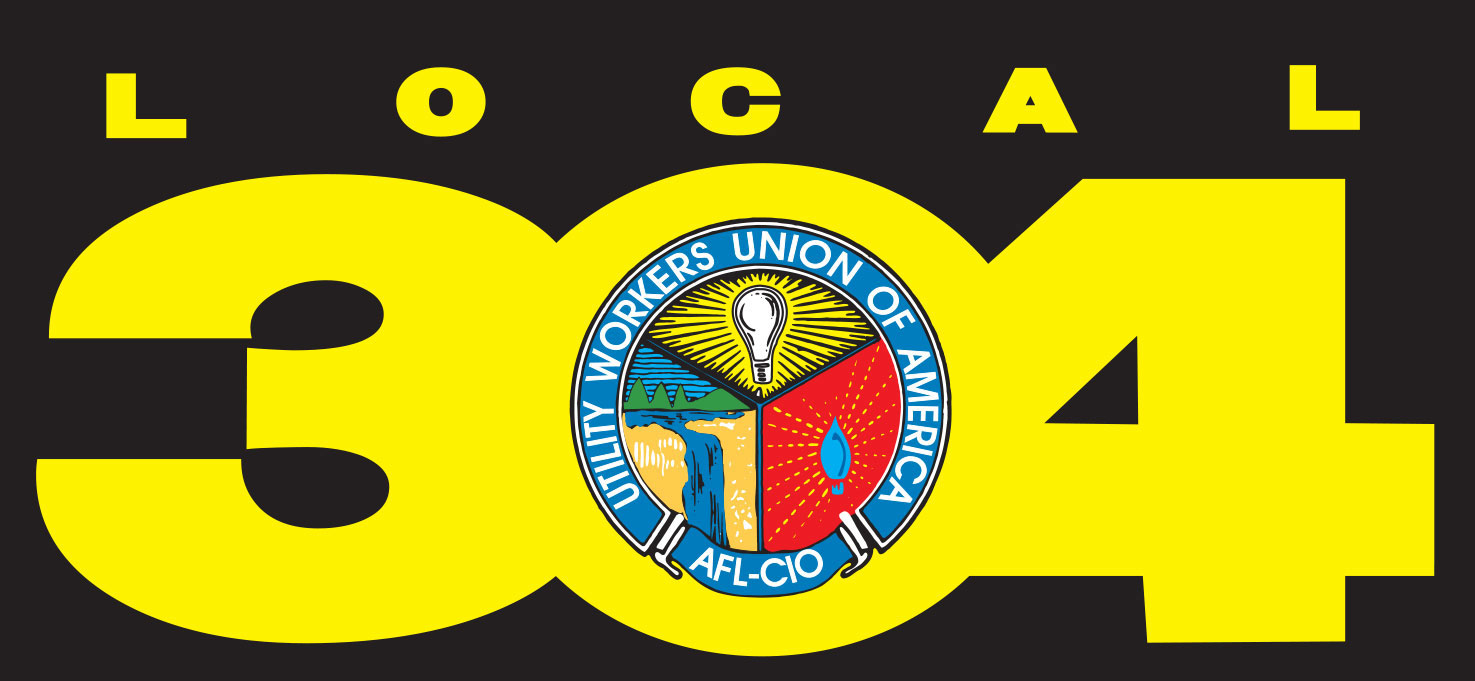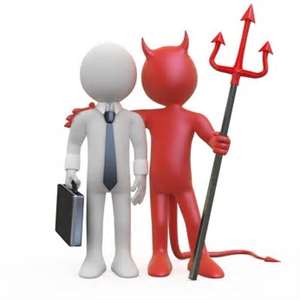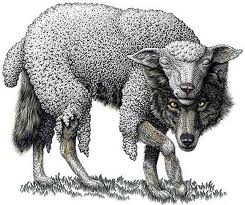Working Without Prosperity
Anyone who works deserves to have some small amount of success, even if that success only consists of the feeling one gets from being a self-supporting and contributing member of society.
West Virginians are in a special circumstance when it comes to work and prosperity. After decades of labor strife, a few coal miners did see a brief period of prosperity from their labor, but with the shrinkage of unionization and the influence of the UMWA, even that small window seems to be closing.
see a brief period of prosperity from their labor, but with the shrinkage of unionization and the influence of the UMWA, even that small window seems to be closing.
Before the industrial revolution and the discovery of our rich coal reserves, West Virginians were mainly farmers, trappers, and hunters. As our country moved deeper into industrialization, those who would seek to exploit our rich coal supply for their own greed moved into our state. They cheated landowners, bought political influence, and set up shop at the head of many hollows to establish mines and start hauling out West Virginia coal.
 West Virginians themselves have not benefited nearly as much as those absentee landlords who owned and operated the mines they worked in. As a matter of fact, West Virginia continues to be one of the poorest states in the nation, an odd happenstance that is in contrast to our rich energy and timber reserves. What workers of this state have reaped are pollution, destruction, and death.
West Virginians themselves have not benefited nearly as much as those absentee landlords who owned and operated the mines they worked in. As a matter of fact, West Virginia continues to be one of the poorest states in the nation, an odd happenstance that is in contrast to our rich energy and timber reserves. What workers of this state have reaped are pollution, destruction, and death.
On December 06, 1907, the Fairmont Coal Company mine in Monongha blew up, creating the worse mine disaster on record in the United States before or since. Official numbers set the count at 361 dead, but this was an era of child labor and the flood of immigrants who worked, undocumented, beside family members who were paid by the short ton for all the coal they loaded each shift. Many old timers claim that the count was far higher, possibly as many as 600, when taking these factors into account.
 Then there is the 38 miners lost in the Boissevain Mine explosion in 1932, or the Consol #9 mine explosion in Farmington in 1968 that claimed 78 miners(the third such explosion in the mine formerly known as Jamison #9), or Holden, Nellis, Robinson-Ferrell, or Eccles #5 and #6, or the Clinchfield Coal Company’s Compass Mine at Dola, just up Route 20 from Lumberport that killed 22 men. Sago and Upper Big Branch are names of West Virginia mines added to the list of disasters visited upon the people of our state and that have become synonymous with tragedy and loss.
Then there is the 38 miners lost in the Boissevain Mine explosion in 1932, or the Consol #9 mine explosion in Farmington in 1968 that claimed 78 miners(the third such explosion in the mine formerly known as Jamison #9), or Holden, Nellis, Robinson-Ferrell, or Eccles #5 and #6, or the Clinchfield Coal Company’s Compass Mine at Dola, just up Route 20 from Lumberport that killed 22 men. Sago and Upper Big Branch are names of West Virginia mines added to the list of disasters visited upon the people of our state and that have become synonymous with tragedy and loss.
Lest anyone thinking that the plight of West Virginia workers lie only in the dark coal mines of our state, there is also the collapse of a scaffold in a  cooling tower, known as the Willow Island disaster, that killed 51 workers in 1978.
cooling tower, known as the Willow Island disaster, that killed 51 workers in 1978.
In fact, the worst industrial “accident” that ever occurred had nothing to do with coal mining, but happened in the New River Gorge area of West Virginia. This was the Hawks Nest Tunnel tragedy. This project of Union Carbide sought to divert the New River for power production to feed the plant in Alloy, West Virginia. Began at the height of The Great Depression, workers dug the 3 mile tunnel in record time, completing it 10 weeks ahead of schedule. The workers, desperate for gainful employment, either  did not know or understand that they were digging through Silica, a substance that causes silicosis in the lungs and is very damaging and even fatal. Many people have stated that it is impossible to quantify what a workers life is worth, but after years of lawsuits against the tunnel’s contractor, the settlement ranged from $400.00 for an unmarried black man to a $1000.00 for a married white man. In typical West Virginia fashion, the offending company settled $4 Million dollars in lawsuits for a paltry $130,000 dollars. Half of that settlement was claimed by the attorneys representing clients, who also recieved an added secret sum of $20K in the settlement insuring against any further lawsuits, and, on
did not know or understand that they were digging through Silica, a substance that causes silicosis in the lungs and is very damaging and even fatal. Many people have stated that it is impossible to quantify what a workers life is worth, but after years of lawsuits against the tunnel’s contractor, the settlement ranged from $400.00 for an unmarried black man to a $1000.00 for a married white man. In typical West Virginia fashion, the offending company settled $4 Million dollars in lawsuits for a paltry $130,000 dollars. Half of that settlement was claimed by the attorneys representing clients, who also recieved an added secret sum of $20K in the settlement insuring against any further lawsuits, and, on  the demand of the defendants, turned over all plaintiff files to them. In total it has been claimed that almost 500 workers died from exposure to silica dust. This number cannot be certified since tuberculosis was rampant throughout the country at the time and many may have died and been classified as victims of TB. What is known that death by overexposure to silica is a painful and miserable way to die, with one family member claiming that an affected relative actually kicked the bed they were dying in to pieces when in the throes of a fit of spasmodic coughing and gasping for air.
the demand of the defendants, turned over all plaintiff files to them. In total it has been claimed that almost 500 workers died from exposure to silica dust. This number cannot be certified since tuberculosis was rampant throughout the country at the time and many may have died and been classified as victims of TB. What is known that death by overexposure to silica is a painful and miserable way to die, with one family member claiming that an affected relative actually kicked the bed they were dying in to pieces when in the throes of a fit of spasmodic coughing and gasping for air.
Families of West Virginia workers also suffered indirectly, through the loss of the  bread winner and patriarch of the family, but also suffered directly from those who came to our state to rape the land, reap the resouces, and then leave like thieves in the night. Each incident described above represents grieving widows, orphaned children, heartbroken parents, and all the social and economic woes such conditions cause.
bread winner and patriarch of the family, but also suffered directly from those who came to our state to rape the land, reap the resouces, and then leave like thieves in the night. Each incident described above represents grieving widows, orphaned children, heartbroken parents, and all the social and economic woes such conditions cause.
Earthen dams had been simple and easy contructs for coal companies to capture coal wastes. That was until the Buffalo Creek Disaster in 1972. Pittston Coal had a dam at the head of a hollow on Buffalo Creek, WV. In a torrent of several days of  rain, the dam became sodden and soft. On the morning of February 26th, the dam burst. Many residents were still asleep when a wall of muddy coal waste laid waste to everything in it’s path An estimated 132 million gallons of water came roaring down the valley, killing 125 men, women, and children. 1,100 people were injured and 4,000 homes were destroyed. An emergency shelter was set up at the Man High School and survivors combed the wreckage looking for loved ones and lost possessions.
rain, the dam became sodden and soft. On the morning of February 26th, the dam burst. Many residents were still asleep when a wall of muddy coal waste laid waste to everything in it’s path An estimated 132 million gallons of water came roaring down the valley, killing 125 men, women, and children. 1,100 people were injured and 4,000 homes were destroyed. An emergency shelter was set up at the Man High School and survivors combed the wreckage looking for loved ones and lost possessions.
Pittston later claimed the disaster to be an, “act of God”.
 An elderly female resident replied, “I never saw God drive the first slate truck up the holler.”
An elderly female resident replied, “I never saw God drive the first slate truck up the holler.”
Again, in actions so typical of our state, one of the last acts of departing West Virginia Governor Arch Moore was a settlement of the multi-million dollar lawsuits against Pittston for the insulting sum of $1 million dollars.
Stories of the children who survived the disaster recall how anxious and nervous they would get everytime it rained.
 Why is all this worth recounting?
Why is all this worth recounting?
It’s because this is a history of labor in West Virginia. Despite the Mine Wars which shed some light on workers issues. West Virginians have, by and large, been poorly represented by local, state, and federal leaders, and exploited by ruthless corporations. It has been West Virginia workers blood that have purchased many of the country’s safety and health reforms, and it is those reforms that are under attack that we have to continue to fight for everyday.
The UMWA is one of the few unions to have any real success in this area. Those intrepid organizers for the UMWA braved the remote and rugged geography, faced down hired gun thugs, and brought a little social justice to exploited and abused workers in this state.
Another union that helped open the door for West Virginia workers is the Railroad Workers United, who represent railroad workers across North America, and fight the same issues as the rest of us.
It is this lack of representation that should inspire every worker in West Virginia to seek out a union of their choice and actively pursue joining. Unions are the purest forms of democracy in our country because they are ran by the workers, not politicians or absentee corporations. They are also an important source of vital information on issues affecting the industries they represent, giving workers information that is hard, if not impossible, to find anywhere else.
Unions that are organized and active act as checks and balances for people who work for a living and seem to be the ones largely ignored when political parties develop grand platforms promising prosperity and reform, but deliver more of the same year after year. Healthy and active unions hold these people to account for promises made in the heat of campaigns.

 The West Virginia AFL-CIO, with whom we are affiliated with, represents over 575 affiliated unions who fight for all West Virginia workers, whether they are union or not. Unions set the bar for wages, benefits, and working conditions for all workers. UWUA Local 304 would like to wish departing longtime President Kenny Purdue a happy retirement and welcome his replacement, Josh Sword, to the top job at the helm of West Virginia’s labor movement.
The West Virginia AFL-CIO, with whom we are affiliated with, represents over 575 affiliated unions who fight for all West Virginia workers, whether they are union or not. Unions set the bar for wages, benefits, and working conditions for all workers. UWUA Local 304 would like to wish departing longtime President Kenny Purdue a happy retirement and welcome his replacement, Josh Sword, to the top job at the helm of West Virginia’s labor movement.
Josh Sword Kenneth Purdue
(CLICK ON THE LINKS HIGHLIGHTED IN THE ARTICLE FOR MORE INFORMATION)
Lessons For Effective Management, Issue #1
Issue #1- Love Your Hell Raisers
There are a lot of books, articles, even whole magazines that are devoted to teaching managers how to be effective leaders so they can maximize their human performance for greater efficiency and profit. You have heard many of them mentioned on this site. Books by multi-millionaire CEOs that light the way for other CEOs, like “Jack Welch and the GE Way“, or Al Dunlap’s “Mean Business.” These books are so powerful that they spawned books about them and the authors, like “Chainsaw: The Notorious Career of Al Dunlap in the Era of Profit-at-Any-Price,” and, “The Billionaire Shell Game”.
Before the era of “GREED” and the philosophy of “ME”, management training focused on building relationships between management and employees through the values important to most of us, like decency, respect, forgiveness, and the lessons we learned about The Golden Rule; ““So whatever you wish that others would do to you, do also to them, for this is the Law and the Prophets” (Holy Bible, Mathew 7:12).
These principles were ingrained into us as Americans, and business and industry adopted them from lessons learned over decades of violent labor uprisings, work stoppages, and bloody strikes. Through concessions won through unionization, the American workplace evolved into an extension that reflected our society. The ideals of fairness, justice, and equality found their way to the shop floors and became the expected standard rather than the exception.
So what happened?
What happened was that working people mistakenly thought the war was over. We thought, wrongly, we had earned the right to simply go to work, do our job, collect our pay, and go home in peace. Meanwhile, the corporate masters were plotting, and then – BOOM– they launched their attack!
They didn’t aim their guns at the workers, who had been lulled to sleep by decades of labor bliss. So soundly we slept that we quit paying attention to politics and business trends. We didn’t go to our union meetings, and pretty soon our elected political representatives, as well as union officers, started looking out more for themselves and not us.
Still, we slept.
Then, a little at a time and after the corporatists put their political lapdogs to work to change the laws to justify it, wages and benefits started falling. Two-Tier contracts and concessions became the new norm. For those unions that were left, promises were made that these were temporary emergency measures to help workers keep their jobs and be competitive. Companies claimed that much of the cuts would not be necessary if they didn’t have to comply with the restrictive and outdated notions of collective bargaining agreements, so union membership fell more.
We were assured that our industrial base didn’t matter because we would all have high paying jobs in technology. Then the tech jobs followed our manufacturing out of our country and to those countries who have enslaved citizens who work for less than sustanance wages and live in abject poverty at the hands of their oppressive leaders.
Now, here we are.
Companies have been bought out or merged and then gutted for their usable parts and for mega-profit, irregardless of communities, workers, and jobs. CEOs are raking in huge sums of money, even when they bankrupt the business they run, as wages for those who do the actual work are in incremental retreat.
While we were told to worry about flag burners, abortionists, gays, and our guns; prevailing wage was killed, and “Right To Work” became the law of the land before we could even blink.
We are told to blame the welfare fraudsters, and that we should drug test the malingerers. In the meantime, the ones who unleashed the jackals of deregulation, greed, and reckless capitalism upon all of us are sitting in far away locales, via their private jets, where their money lays untaxed and hidden while laughing among themselves that we are so easily duped.
There are a few of us who woke up out of our coma early, looked around, and then sounded the alarm. We were labled “radicals,” “troublemakers’, and “hell-raisers.”
We prefer being called, “UNION THUGS”.
It used to be that innovativeness was an asset, creativity a positive, and self assuredness a virtue; now they are viewed as threats. When standing up was once admired, now it is feared. Those who dare, are labeled, targeted, and made examples of as a warning to others.
A lesson business needs to learn over is that they have a duty to treat their workers with dignity and respect. They can preach about it, codify it in long winded wordy corporate policies and guidelines written in eloquent legal-eze, and stop the war on wages, benefits, and working conditions.
To do this, they are going to have to do something that seems unthinkable to business leaders, and that is to embrace their hell-raisers, These folks are their conscience and they are passionate and fully invested in their jobs.
It’s the trouble makers, the radicals, and the hell-raisers that have moved this country forward for well over 200 years. They forced change when faced with injustice, they innovated when facing life’s challenges, and they found a better way to do things that were more productive, safer, and easier.
Together, working people created everything that America stands for and makes our country the beacon of hope it is seen as in the world. Without the radicals, we cease to be America. It’s a part of our identity, our culture, and our heritage.
A Concerned Member
I saw something on our local’s web site that bothered me a little bit. It insinuated that somehow things are getting back to Plant Management from our meetings. Now, I am no one special and really don’t have much to say most of the time, but I couldn’t believe what I was reading.
I attend our monthly meetings when I can and I think of them as a place where I can express myself, with whatever tone or way that I want, without it leaving those four walls. I am not saying we should go to the meetings to yell, scream, and carry on like animals with impunity. I am simply saying that I treat the meetings as a sounding board or “rough draft”. A place where I can get other opinions, feedback, and direction when needed. One day I may even be able to help someone else in this way.
Having said all of that, I usually try to look for the good in everything and I have a hard time believing that someone in our midst is an actual turncoat. I am going to hope that whatever information got out and however it got out was an accident. Maybe someone else over heard something said and it slipped out that way, I am not sure.
I would just like to remind my fellow Union Members that loose lips sink ships. While whatever is said at the meetings is not something we are trying to hide, it could be used against other members when it was not intended to be. Remember some things are “rough drafts” and still need a little fine tuning before it is presented in an official capacity.
I know it is tough to get the information out from the meetings when we don’t see each other outside of work or meetings very often. Somethings that take place at work are hard not to talk about and I get that. I hate to sound like a broken record, but these are the reasons we need our members at our meetings. The members that do attend our meetings can’t give you all the information you are looking for. It is hard to remember what is said and why when we cover so many topics. Also, you never know the intent of someone listening close by or if you got all of the facts right to begin with.
I just want everyone to remember that we are all in this together. Unfortunately, lines have been drawn. While we didn’t draw these lines and hope they will disappear soon, we have to stay together. Remember that true progress takes time and it takes even longer if we don’t stay focused on the task at hand. Our task at hand is to make a better and safer work place for everyone.


